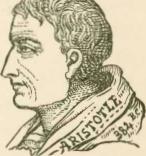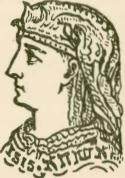34 HISTORIC GROWTH OE' MAN.
After the first captivity, there came the great era of Hebrew prophecy. In our seventh chapter, we shall speak of the influence and bearing which those prophecies have upon our own age. The Jews never again attained a complete independence. The Syrians, Greeks and Romans ruled them in turn until the destruction of Jerusalem in 69 and 70 A. D. From that time the Jews were scattered over the earth, yet always preserving their language, their history and
their religion.
PHENICIAN GROWTH. The first
branch of the Japhetic tribes to reach civilization had strayed to the nearest home. They had turned down the east coast of the Mediterranean Sea and founded Phenicia. They invented an alphabet from the old hieroglyphics and a little later they established commerce on the
sea. They stood in friendly relations with the Hebrews when the latter had driven out the Canaanites, who were of another blood. Hiram, King of Tyre, assisted Solomon in building the temple at Jerusalem, the third largest temple in the world, as its ancient walls still attest.
The genius of Phenicia affected and stimulated other branches which had gone to Greece and Italy. They remained in communication with these branches. The families or tribes of Iavan, Elishah, Tarshish, Kittim and Rodanim planted colonies all along their path from Aram to Italy.
These branching stems grew up in Phrygia, Lydia, and Lycia, and in the Troad. And thus it came to
pass that the earliest Grecian civilization was not in Greece itself but in Asia Minor. In the time of Homer its center was in Asia rather than in Europe. Many of the greatest of the Grecians were born outside of Greece proper. Such were Homer, Aristotle, Apelles, Pythagoras, Archimedes and others.
TILE GRECO-ROMAN CIVILIZATION
1-11
was planted on a seacoast and on fi islands the most diversified in the world. These varied physical features of the country impressed and molded the Greek character. Here was to be produced the most varied talents and the most elaborate genius that the world had yet seen.
The infancy of Greek national life may be reckoned from the age of Homer (about 1200 B. C.) to Thales, 636 B. C. The Greeks of that age believed that the sky is the floor of heaven ; that the earth is flat and full of dragons, monsters and marvels. Alreac4'r in this age their art was emerging from the fixed and stiff forms of Asia.
Grecian childhood lasted from Thales to Socrates, 468 B. C. It was a period of active but not of fruitful speculation. Thales taught that the first principle of all things is water ; that humidity originates warmth, and that the world has a soul. Anaximenes said that the air is the principal thing, all things spring from it, and the air is God. Diogenes thought that the air has knowledge and is conscious. Anaximander discovers the obliquity of the ecliptic but thinks that the earth is a cylinder, 61o B. C. In other things he was like a Darwinian, for he taught
GR,ECO-ROMAN PHASES.
35

